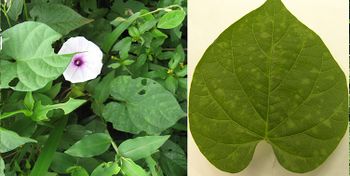Sweet potato chlorotic fleck virus
| Literature database |
|---|
| 21 articles sorted by: |
| • year (recent ones first) |
| • research topics |
| • countries/regions |
| • host plants |

Author(s): Arthur K. Tugume, Settumba B. Mukasa, and Jari P.T. Valkonen
Source: PLoS ONE (2016) 11, art. e0167769
Sweet potato chlorotic fleck virus (SPCFV)
This virus has been originally described from Peru (South America), but has been subsequently also recorded in other parts of South America, Africa, Asia, as well as in Australia and parts of the Pacific. In some countries it has been reported to be a common virus in sweet potatoes, however, often as mixed infections with other viruses (e.g. see Arthur K. Tugume et al., 2016). Symptoms include chlorotic spots, chlorosis, leaf distortion, and vein clearing. Mixed infections with the Sweet potato chlorotic stunt virus result in severe symptoms. The vector of SPCFV is unknown.
SPCFV is a positive-sensed single-stranded RNA virus with a genome of around 9.1 kb and 6 open reading frames (ORFs). ORF1 encodes a viral replicase, ORF2 to ORF4 encode triple gene block proteins, ORF5 encodes the coat protein, and ORF6 encodes a putative nucleotide-binding protein.